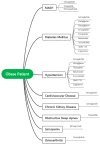Pharmacologic Disruption: How Emerging Weight Loss Therapies Are Challenging Bariatric Surgery Guidelines
- PMID: 40731921
- PMCID: PMC12299311
- DOI: 10.3390/medicina61071292
Pharmacologic Disruption: How Emerging Weight Loss Therapies Are Challenging Bariatric Surgery Guidelines
Abstract
Obesity is a chronic, relapsing disease with multifactorial origins and significant global health implications. Historically, bariatric surgery has been the most effective intervention for achieving sustained weight loss and metabolic improvement, especially in individuals with moderate to severe obesity. However, the therapeutic landscape is rapidly evolving. Recent advances in pharmacotherapy-including GLP-1 receptor agonists, dual and triple incretin agonists, and amylin-based combination therapies-have demonstrated unprecedented efficacy, with some agents inducing 15-25% weight loss, approaching outcomes once exclusive to surgical intervention. These developments challenge the continued applicability of existing bariatric surgery criteria, which were established in an era of limited medical alternatives. In this narrative review, we examine the evolution of surgical eligibility thresholds and critically assess the potential role of novel pharmacotherapies in redefining treatment algorithms. By comparing the efficacy, safety, metabolic benefits, and cost-effectiveness of surgery versus next-generation drugs, we explore whether a more stepwise, pharmacotherapy-first approach may now be justified, particularly in patients with BMI 30-40 kg/m2. We also discuss future directions in obesity management, including personalized treatment strategies, perioperative drug use, and the integration of pharmacologic agents into long-term care pathways. As the field advances, a paradigm shift toward individualized, minimally invasive interventions appears inevitable-necessitating a timely re-evaluation of current bariatric surgery guidelines to reflect the expanding potential of medical therapy.
Keywords: anti-obesity agents; bariatric surgery; glucagon-like peptide 1; obesity; weight loss medications.
Conflict of interest statement
The authors declare no conflicts of interest.
Figures
Similar articles
-
The clinical effectiveness and cost-effectiveness of bariatric (weight loss) surgery for obesity: a systematic review and economic evaluation.Health Technol Assess. 2009 Sep;13(41):1-190, 215-357, iii-iv. doi: 10.3310/hta13410. Health Technol Assess. 2009. PMID: 19726018
-
The Black Book of Psychotropic Dosing and Monitoring.Psychopharmacol Bull. 2024 Jul 8;54(3):8-59. Psychopharmacol Bull. 2024. PMID: 38993656 Free PMC article. Review.
-
Management of urinary stones by experts in stone disease (ESD 2025).Arch Ital Urol Androl. 2025 Jun 30;97(2):14085. doi: 10.4081/aiua.2025.14085. Epub 2025 Jun 30. Arch Ital Urol Androl. 2025. PMID: 40583613 Review.
-
Treatment of obesity: will incretin agonists make bariatric surgery a thing of the past?Intern Med J. 2025 Mar;55(3):369-375. doi: 10.1111/imj.16625. Epub 2025 Feb 21. Intern Med J. 2025. PMID: 39981788 Review.
-
Emerging pharmacotherapies for obesity: A systematic review.Pharmacol Rev. 2025 Jan;77(1):100002. doi: 10.1124/pharmrev.123.001045. Epub 2024 Nov 22. Pharmacol Rev. 2025. PMID: 39952695
References
-
- WHO . Obesity and Overweight. World Health Organization; Geneva, Switzerland: 2025. [(accessed on 3 July 2025)]. Available online: https://www.who.int/news-room/fact-sheets/detail/obesity-and-overweight.
Publication types
MeSH terms
Substances
LinkOut - more resources
Full Text Sources
Medical
Research Materials


